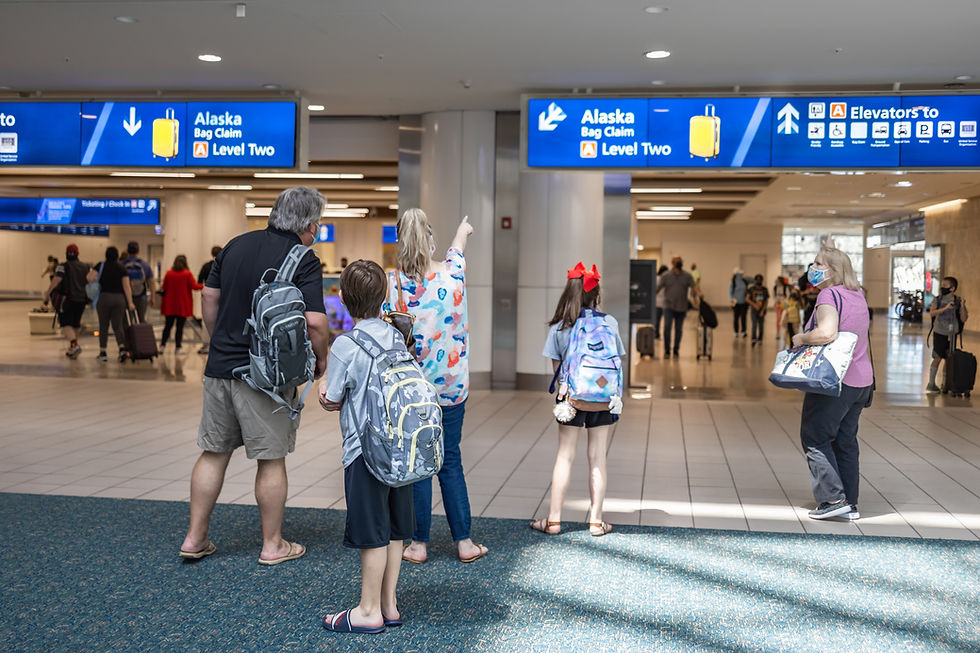How You Can Enhance the Airport Experience with Content Strategy
- Abagael Rudock

- Sep 8, 2025
- 4 min read
Effective communication is the cornerstone of incredible airport experiences. Key touchpoints, such as FIDS, are prime locations for transformation, but it takes careful strategy to make the most of them.

At this year’s FTE Global panel, Smarter Signage Starts Here: Strategy, Content, and Systems that Deliver, industry leaders from airports and engineering teams will explore how content-first strategy is transforming passenger engagement. Join us at 11:30 AM on Thursday, September 11 for the live session, or find time to meet with our team in Long Beach.
In today’s blog, we’re getting a head start on the conversation. Keep reading for an exclusive look at how content strategy transforms passenger engagement and enhance their airport experiences, with a special focus on FIDS.
Airports Need Content Strategy First. Not Screens.
The industry has come a long way from split-flap displays and static signage.

Today’s passengers expect real-time information to always be available at their fingertips. Whether they’re checking wait times, navigating the terminal, or exploring concessions, passengers want information to be accessible, and their questions answered quickly. Information needs to be consistent on screens, on signs, and on all other platforms.
To meet these demands, airports need strategic content. Static displays aren’t enough. With the rise of AI and automation, change is happening fast, and airports don’t have time to play catch-up.
Case Study: Content Strategy Makes FIDS More Impactful
Synect’s FIDS of the Future reimagines the familiar display as a strategic communication platform. Our content responds to passenger needs by prioritizing time-sensitive updates. Always-accurate data pulled straight from airports’ data feeds makes it easy for passengers to access and act on information at a glance.

Rather than deliver dense, spreadsheet-style information, Synect’s FIDS of the Future gives more space to high-priority, time-sensitive information such as the nearest departing flights and gate changes. Less urgent information gets less space to reduce visual clutter. Color-coded updates help passengers quickly recognize changes to their gate, departure time, and much more.
As traffic volumes change, so does the interface. Our FIDS of the Future automatically updates the display based on flight schedules and traffic volumes. In high traffic periods, smaller content shows more flights; in low traffic periods, larger content shows fewer flights.
This sample addresses what passengers need from FIDS, but with a strong content strategy and smart, flexible tools like Passenger360, airports can do even more. From adding wayfinding information to introducing targeted concessions displays, the sky is the limit with digital content management systems (DCMS).
Waiting Comes at the Cost of the Airport Experience
Early content strategy discussions are critical. Delaying content strategy discussions leads to bad design and bad signs, as Faith Varwig said during our 2024 FTE Global panel.
Poorly planned signage leads to:
Over-investment or ineffective investment in hardware
Inconsistent messaging
Inconsistent visual design
Higher costs for design, redesign, and hardware
Confused passengers
Slow operations
Lower trust
Less satisfaction
These issues don’t just affect signage. They ripple across the airport from passengers to operators, to partners like airlines, concessionaires, and TSA.
Smart Systems are Future-Ready
Mike Youngs said it best during FTE Global 2024: good content strategy is good IT strategy. When airports use smarter systems, they can do more with fewer tools and scale their strategy across terminals.
As Ian Birnbaum of Burns Engineering will explore during our panel, new strategies mean new systems. Leading airports are moving toward digital content management systems, or DCMS, to support a wider range of content across a wider range of displays.
Platforms like Passenger360® transform digital displays into flexible, high-impact communication tools. With custom rules and automations, airports can always deliver the right message at the right time.
Start Early and Scale Smart
The most successful airports build their content strategy early. They bring together key stakeholders from marketing, IT, customer experience, and more to ensure that the content they create will serve every stakeholder—including passengers. They choose a DCMS that integrates easily and supports real-time communication. And they only invest in screens after content is planned.
With content-first strategy, every part of the airport is transformed. FIDS goes from a purely informational board to an opportunity for engagement. Signage drives connection, influences behavior, and drives ROI.
Ready to learn more? FTE Global starts tomorrow, so make sure to get in touch quickly! Here's how you can find our team in Long Beach:
🗓️ Smarter Signage Starts Here: Thursday, September 11 at 11:30 AM.
🚶♀️ Accessibility Tech & Innovation Briefing Tour: Wednesday, September 10 at 3:30 PM
📍 Visit us in Booth D5
📲 Schedule time with the FTE App
Won’t make it to the show? We’re only a message away.


